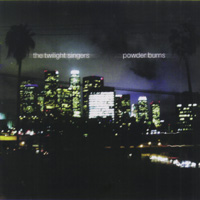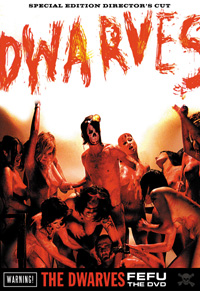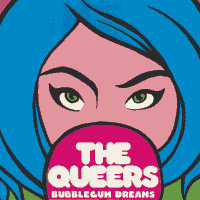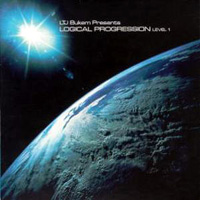 LTJ Bukem
LTJ Bukem
Logical Progression (London)
An interview with LTJ Bukem
by Joshua Brown
Although many DJs this side of the Atlantic may look at you like you’ve got eyeballs in your nostrils when you ask them if they spin any of it jungle (aka drum ‘n’ bass), a relatively new and swiftly expanding category of electronic dance music, is as accepted in its native London as the undrinkability of their water. Jungle’s first protagonist to garner the attention of our music press was Goldie, now husband of Björk. Correct me if I’m wrong, but would someone as precious and “with-it” as Björk tie the knot with a musician who wasn’t part of one of the hippest forms of music alive? Not likely. What’s even less likely is that you’ll find a better representation of what moves the world of drum ‘n’ bass than LTJ Bukem‘s two CD set, Logical Progression (ffrr/London). The first disc spans a five year period of releases on Bukem’s own sister independent labels (Good Looking and Looking Good), while the second showcases his mixing expertise. To use the inevitable rainforest parallel, the never-ending scuttle of animal life is a barrage of frantically structured beats and predatory bass, enclosed within a lush canopy of ambience and sustained by frequent showers of vocal bliss. Dancing in metaphysical abandon never required less Ecstasy. As drum ‘n’ bass carves its indelible mark anywhere dance music has a forum, no one can refute LTJ Bukem’s role in making it all possible, as DJ, musician, remixer, and resident/promoter of London’s popular “Speed” club.
How do you describe drum ‘n’ bass to someone who hasn’t heard it?
Music with a breakbeat orientation. Let’s say 160 beats per minute, with many musical influences laid down on top of it, from every kind of sound and music.
Do you often turn down remixes?
Yeah, I’ve turned down hundreds of remixes. There’s no point in my doing a tune for the sake of doing a tune. My remixes often aren’t remixes as one might think of them. They’re more like new jungle tracks with bits of the original tune in there.
What about Michelle Gayle or Jodeci’s remixes being plugged as “MTV-friendly?”
Nothing I do varies from what I normally do. There’s no way I’d set out to make a tune commercially viable. That’s selling out to me.
So you don’t think we’ll be hearing your stuff on the radio anytime soon?
Ah, I don’t know. What is commercially viable? It’s something that appeals to the masses.
Do you feel drum ‘n’ bass is corruptible by too much media attention or absorption into the mainstream?
It depends on who’s involved, who the attention is focused on. I’ve got a strong belief in what I think drum ‘n’ bass, and our scene, is all about. You should never vary from that.
What is the outlook of the scene you’re describing?
Different. Many people hate that DJs who’ve just gotten into the music in the last couple years are making tunes now and selling them. Some are going absolutely mad about it. As far as I’m concerned, real people know what the real music is, so the rest of it doesn’t bother me.
Do you prefer the term “drum ‘n’ bass” to “jungle?”
It’s all rave music. When I first started going out, the rave scene was happening, and I don’t see it as any different now. All the terminology in the rave scene is just hideously stupid, with words like “intelligent.”
Some DJs are distancing themselves from the “rave” tag. What failings, if any, do you see in the rave scene as a whole?
I don’t even want to go into it. What’s negative to me might be positive to another, so I’m not gonna dis them for trying.
What are the typical criticisms of drum ‘n’ bass?
One is that it’s an excuse to rip off old house samples. That’s a farce ’cause the house scene’s ripping itself off with re-diluted tunes that sound like ones from three years ago.
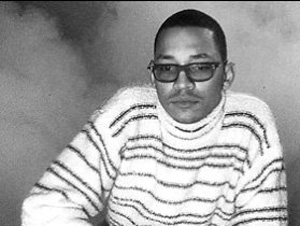 So it’s people in the e house scene who criticize jungle?
So it’s people in the e house scene who criticize jungle?
Some criticize it. Some people love it, like Paul Oakenfold and Sasha.
What did you start out playing as a DJ, and where did that lead you?
I started playing things like the Jam and the Police, doing house parties from a very early age. I also played ’70s funk, reggae and the lot. From there it went to hip hop, because of the breaks, like in ’70s music. Even the Jam. There was a serious breakbeat in that music.
You’re a big fan of mod music?
I used to be. I haven’t listened to the Jam in 10 or 15 years. Some of the drum loops the mods used really got me going. The natural progression was to go on to hip hop. I saw Rap Attack’s sound system in the early ’80s, how he mixed two things at once – old soul with new hip hop beats – and I thought, “Well, that’s the way it goes.” I promptly got two decks and a mixer and started doing that, along with funk and reggae, combining it all. Then we came upon the early rave scene, like ’87 and ’88, with “acid” and whatever. That didn’t last long, but a lot of bits and pieces of it did. Then we veer toward the breakbeat side of things. In 1990 I was heavy into breakbeat. A lot of people were playing techno still.
Most of the dance music of the early ’90s sounds dated. What did you do to achieve such a timeless quality on songs like “Demons Theme” and “Music?”
I’ve always had this tendency to like timeless music, like the early soul movement. 1970 to 1980 was like, my ten years, man. I’m still collecting records from that period. My hope is that my music is along the same lines as early soul, that it has the same timeless feel. And it seems to have had that effect.
What music closely parallels drum ‘n’ bass?
For me, the ’70s. The Love Unlimiteds, the Barry Whites, the Bobby Humphreys, the Roberta Flacks, J.B.s . . .
Why does the press call you “the Derrick May (Detroit techno innovator and Transmat label exec) of hardcore?”
Well, I don’t like all those comparisons and analogies. I’m the LTJ Bukem of jungle, know what I mean? Derrick May is the Derrick May of techno. How can I be the Derrick May of jungle? I understand what they’re driving at, and I take it as a great compliment ’cause I admire the man to the utmost. But I am who I am.
How did it go at the ENIT festival?
There were no monitors when I got there. Because of that, I missed my time and had to wait four hours to play. When I did play, they turned the sound system so low that it was ridiculous. I just pulled my record off and stopped. It was disgusting. That would never have happened in England.
What’s your most radical tour story so far?
New York, man. New York was just unreal, an unbelievable reception. It’s so good to see people getting into it in the same way, and get excited like I do. That’s what it’s all about for me.
What’s your reception been like in the various countries that’ve booked you?
I’d say 90% absolutely brilliant. It’s been exciting for me, going to all these places for the first time, and unleashing this music on new minds. I haven’t had many bad times at all. It’s proven to me a lot about this music.
What are the advantages and disadvantages of running two labels while doing everything else?
The advantage is that you can put out what you want when you want, and there’s no one telling you how to market it. The disadvantage is that it’s bloody hard work. I’m trying to stay independent, not sell it off like everyone else. And try to progress and get a jump ahead in music. But still, it’s an independent, so it’s a long, hard road to go.

